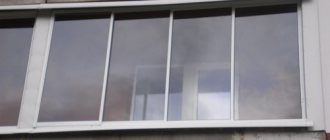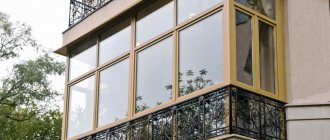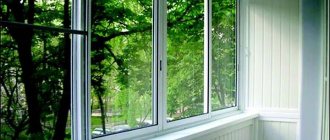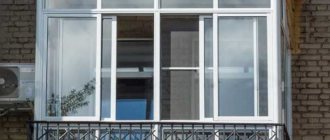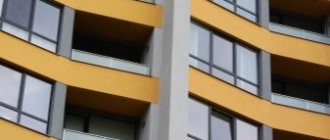Numerous property owners in multi-storey buildings still ignore permission to glaze a balcony or loggia. That is, in fact, such apartment owners unauthorizedly carry out construction work, which leads to a change in the appearance of the facade of the house and can, in some cases, negatively affect the load-bearing structures of the building. Without coordination of the issue with the municipal administration, everything can end sadly for the property owner. And you shouldn’t focus on the lucky neighbors who didn’t take any permits and to this day have not suffered any punishment. They have everything ahead of them.
What threatens citizens for unauthorized glazing?
Most often, the prospect of a fine of up to 2,500 rubles, which is provided for by the Code of Administrative Offenses of the Russian Federation, art. 7.21 does not frighten property owners at all. In the absence of other measures, they would include this amount in the total cost of glazing and calmly violate the law further. However, the authorities did not limit themselves to just a fine and, in addition to it, introduced a requirement to carry out dismantling at their own expense. If the owner of the apartment decides to limit himself to a fine and does not remove the glazing, then the municipal government has the right to use Art. 29 of the Housing Code of the Russian Federation and evict the offender. The ways to implement this procedure depend on the form of ownership of the property.
Important aspects
Is glazing a balcony a redevelopment? If the plans do not provide for its combination with a room or kitchen, in this case special permission will not be required to glaze the balcony space.
Redevelopment is any change in area compared to the apartment plan. Balcony glazing is considered a repair only if its dimensions have changed as a result of the repair. For example, when dismantling a kitchen window. To carry out such activities, official permission will be required.
All owners must agree to the redevelopment. Otherwise, one of the residents may challenge the actions related to the redevelopment in court.
When approval is necessary
Most property owners believe that approval is only necessary when increasing the size of the balcony by more than 300 mm around the perimeter of the base slab. They calmly begin the remodel, but may soon run into problems. This means that even without increasing the area of the balcony, paperwork is required. Moreover, ignorance of the requirements does not relieve one from responsibility for their failure to comply. There is only one way to avoid punishment - to study the list of situations that require permission. It includes several points, and you need to be a visionary to foresee possible scenarios. In order not to guess and not take risks, it makes sense to get permission “just in case.”
Interfering with fire evacuation
In Stalin, Khrushchev and Brezhnev buildings, which were built in the last century, metal stairs are installed on the balconies and loggias. They provide evacuation in case of fire. If during the glazing process it is planned to dismantle stairs and seal hatches, you need to contact the supervisory authorities. At the same time, glazing of external structures and loggias with galleries that allow access to smoke-free staircases is completely prohibited.
Increased load on supporting structures
Replacing a metal parapet with a brick one, pouring screed and laying tiles significantly increases the weight of the enclosing structure. Exceeding the permissible weight may be critical for the load-bearing slab. An increase in the load on load-bearing slabs in old residential buildings is considered especially dangerous. In such situations, the problem can only be solved by strengthening the slab. Moreover, the development of the design bureau must completely satisfy the representative of the authority issuing permission to remodel the balcony.
Selling an apartment
When completing a transaction, the data from the technical documentation is carefully checked with the actual characteristics of the apartment.
Unauthorized glazing will either be forced to be removed or a permit will be required (doing this after the fact is problematic). Since few people can predict the sale of a home, permission may actually be required at any time. When transferring ownership rights, the technical passport of the BTI must contain a note about the reconstruction, which can only appear if official permission is received. According to the Code of Administrative Offenses of the Russian Federation, Art. 7.21 in the absence of a certificate of changes certified by an official, the new owner faces a fine and subsequent dismantling, which scares off buyers. In addition, sanctions may be applied to the current owner of the property when completing the transaction.
Influence on the appearance of the façade plane
A renovated balcony can worsen the aesthetics of the facade and annoy neighbors. If the glazing was done without permission, the residents of the house can have it dismantled. Situations like this are not uncommon. It is impossible to predict the reaction of neighbors. Especially when you have a difficult relationship with them. In this case, having a permit is additional protection from inadequate tenants of the house.
Getting a loan
When you plan to leave an apartment with a glazed balcony as collateral, the bank will require all permitting documentation. It is needed in case the property becomes the property of a financial institution. That is, the bank will check the entire package of documents as carefully as when selling an apartment.
Impact on insolation of interior spaces
Some glazing projects provide for a significant reduction in the area of the light opening. This negatively affects the level of insolation of interior spaces. It is almost impossible to obtain official permission to implement such a project, so before starting work it is better to choose another option for remodeling the balcony.
conclusions
Coordination with the city “de facto” is not required if:
- the balcony is glazed until 2022;
- the balcony is glazed after 2022, but does not violate the concept of the facade and does not overload the balcony slabs.
Coordination with the management company “de jure” is not required, but in some cases (to save time) you have to make concessions by paying for “technical supervision” and the project.
As it becomes clear, coordinating balcony glazing is not such a serious problem if you rely on the legislation and know how to use it. Any pitfalls can be easily avoided.
If you want to equip your balcony and make it warm, contact us. If you decide to combine a balcony (or loggia) yourself, do not hesitate to call: we will advise and consult you for free.
We are always in touch and ready to help. Call daily with respect to you and your colleagues in the workshop.
Team "Your Home"
What documents are needed to approve glazing?
To speed up the permitting procedure, it is advisable to prepare in advance. After all, it may take some time to complete some items. Before visiting the housing inspectorate, it is enough to collect a standard set of documents:
- an application, the form of which is approved by a local executive body authorized by the government of the Russian Federation;
- documents confirming ownership;
- a positive conclusion from the organization responsible for the protection of architectural monuments;
- technical passport of the facility where redevelopment is planned;
- design documentation for the reconstruction of residential premises;
- written consent from all family members and other citizens who have the right to use the premises being converted;
- consent of neighbors living in adjacent apartments (if glazing with removal is planned on the ground floor, the permission of the majority of the residents of the entire building is required).
It can take a lot of time to obtain permission from relatives (if they do not currently live in the apartment) and neighbors. Sometimes you need to wait for a project when the agency does not offer a standard option, but prepares technical documentation from scratch. In some cases, authorities may ask for photographs of the building's façade to understand how glazing will affect the aesthetics of the property. This point is relevant for old-built houses that are located in the central part. However, exceptions are possible.
Questions and answers
Can I glaze my balcony?
You can replace balcony windows, doors, and insulate the walls on the balcony when there are no following restrictions:
- the house is dilapidated - the load-bearing slab may collapse from excess load;
- glazing violates fire safety rules, for example, it is unacceptable for access to a fire escape;
- new windows disrupt the appearance of historically significant buildings and architectural monuments.
What ultimately changes from March 1, 2022?
For ordinary citizens - nothing. From March 1, new rules for the operation of residential premises will come into force. They introduce restrictions for legal entities that own premises. The requirements for individuals remain the same. Fines for illegal balcony glazing were in the previous version and will be in the new edition of the rules.
Stages of obtaining permission to carry out glazing
In the traditional sense, redevelopment of a loggia or balcony involves connecting them to living rooms, but glazing is equated to this procedure, since its compliance with certain hygienic, fire safety and sanitary standards is mandatory.
Since the structures place an excess load on the floors and parapets, its magnitude must be assessed by specialists. You should also make sure that such glazing is safe and will not lead, for example, to the collapse of a balcony. The very sequence of obtaining documentation, according to which the redevelopment of a loggia or balcony will be allowed, is described in detail point by point in Moscow Government Decree No. 73-PP dated February 8, 2005:
- At the very beginning, it is necessary to request a technical passport from the BTI, which will reliably reflect information about the current condition of the housing for further planning of the glazing project;
- Then you need to obtain a conclusion that glazing is acceptable from the organization that was previously involved in developing the design of the building itself;
- With the conclusion in hand, you need to go to an organization with a license giving the right to draw up design documentation for glazing loggias or balconies;
- Coordinate all issues down to the smallest nuances with the DEZ (management company);
- Rospotrebnadzor must confirm that the structures do not violate sanitary and hygienic standards;
- The State Fire Safety Inspectorate issues a similar conclusion on compliance with the necessary fire safety standards;
- A conclusion on the compliance of the glazing with the general appearance of the façade of the object is issued by the Moscow Committee for Architecture;
- In cases where the building is an architectural monument, the Moskomnasledie organization will need to go through a very complex procedure for approving the designed glazing;
- When owning real estate under a rental agreement, it is necessary to go through the approval procedure at the Moscow Housing Policy Department;
- Sometimes permission from the Federal Security Service (FSO) may be required - it is needed in cases where the building is located near a government highway;
- When all the certificates have been collected, they need to be taken to the Moscow District Housing Inspectorate, which is responsible for issuing permits for glazing.
Features of the procedure
When discussing the question of whether glazing a balcony is a redevelopment, we note that it is impossible to carry out internal or facade reconstruction without permission from special government bodies. All aspects of the procedure for adding a balcony to the living space of an apartment are controlled by special authorities. In their work they are guided by three legislative acts:
- Housing Code of the Russian Federation;
- Decree of the Government of the Russian Federation No. 491 (2006);
- Resolution of the State Committee of the Russian Federation for Construction and LCD Complex (2003).
Grounds for refusal to approve glazing
The presence of all necessary documents does not 100% guarantee obtaining permission to carry out repair and construction work. In some cases you may be refused. Most often, problems arise in the following situations:
- mistakes were made when designing the glazing;
- dilapidated supporting structures: slab, walls;
- the building in which the work is planned has historical value;
- the project provides for critically dangerous interference with load-bearing walls;
- Removing or altering the balcony threatens nearby communications.
In this case, the refusal must not only be documented, but also registered with the BTI.
The entire registration procedure takes 3 working days. If the applicant is verbally prohibited from glazing the balcony, he must request that the refusal be formalized according to the rules established by law. Moreover, the applicant has the right to challenge the documented refusal in court. All rules of procedure are prescribed in Art. 27 Housing Code of the Russian Federation. An applicant cannot be refused without specifying specific violations. Links to them should be included in the final document. Refusal is also possible for organizational reasons:
- the applicant did not provide all the documents listed in Part 2 of Article 26;
- the organization issuing the permit received a negative response to the interdepartmental request from other government authorities;
- the provided redevelopment project does not comply with legal requirements;
- the applicant did not provide, within 15 working days, the information and documents requested by the organization that issues the glazing permit.
Work can begin only after receiving a positive response, which is supported by relevant documents. Redevelopment that began at the stage of receiving documents is considered unauthorized by law. In such a situation, government officials are authorized to demand that the glazing be dismantled. Moreover, there is no 100% guarantee that the permit will be issued soon.
To avoid problems when signing the act of acceptance of the object, you cannot perform other work without permission. The received permit only gives the right to glaze the remote structure.
What to do after installing glazing
When, after receiving permission, the glazing process is completed, it is necessary to invite employees of the DEZ and employees of the Moscow Housing Inspectorate for inspection. In some situations, the presence of a representative of the district government is also required. If inconsistencies are found, the deficiencies must be eliminated, and then employees of the listed organizations will make a second visit and sign a reorganization act. After this, it is necessary to invite an inspector from the BTI, who, based on new measurements, will make changes to the apartment’s registration certificate.
What is prohibited by law when glazing balconies and loggias
There are quite a lot of restrictions when it comes to glazing and interior decoration of these premises. Some of them are of an individual nature and you can find out exactly about them in the process of obtaining permits. At the same time, there is a common list of activities that cannot be performed:
- cover the internal walls of the balcony with clapboard and any other flammable materials;
- install radiators or any other types of heaters that are connected to central communications;
- install a “warm floor” system.
The redevelopment of non-residential premises is currently regulated by Chapter 4 of the Housing Code, and the list of documents depends on which building contains the balcony that needs to be glazed.
Legal subtleties
To understand whether glazing a balcony is a redevelopment, let us turn to the regulatory documents regulating this area. The process of combining it with a room or kitchen is specified in the law as reconstruction, and not as redevelopment of an apartment. As a result of such actions, the purpose of the balcony area changes.
The balcony becomes a living space, which increases the area of the apartment. Next comes the glazing of the balcony. Illegal redevelopment threatens the owner with serious fines. Changes that were made during the repair must be made in two passports: cadastral and technical. The second one is issued by the BTI. When combining the space of a balcony and a living room (kitchen), the owner is obliged to change the title documents. Otherwise, there will be a discrepancy between the actual area of the apartment and what is indicated in the documents.


